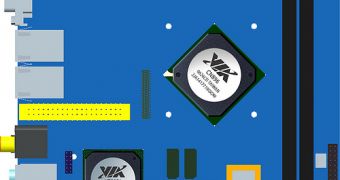Some of the users attending this year's Computex show might have expected the release of a new NVIDIA chipset with support for VIA's recently released Nano processor. Unfortunately, these users were left disappointed as they could only see the release of VIA's Mini-ITX 2.0 Platform. Although this was pretty impressive nonetheless, the real news should have been the release of the Nano-supporting NVIDIA chipset.
As we have recently informed you, VIA was proud to announce its latest Mini-ITX 2.0 Platform and, for that matter, they even demonstrated the product's capabilities at this year's Computex show. In order to enable the demonstration, the platform was built with a 1.8 GHz Nano processor and a discrete graphics card from NVIDIA. With this configuration, VIA's Mini-ITX 2.0 platform was capable of flawlessly running the Crysis PC video game. Although the demonstration was impressive and displayed the great computing potential of VIA's products, some users could not help but expect that the partnership between the two companies be marked by a chipset released from NVIDIA.
And they were not even that much off-base, come to think that word did get out, prior to Computex, that an NVIDIA integrated graphics chipset was in the works. Unfortunately, when asked about plans for such a product, NVIDIA's executives didn't comment, but they did leave enough room for speculations about future announcements.
"That's not what we're talking about today. Having said that, we are working closely with VIA in several different areas," said Drew Henry, general manager of NVIDIA's Media and Communications Processor business.
What we can understand from Drew Henry's statement is that VIA is most probably going to benefit from this collaboration, especially since NVIDIA has integrated and discrete graphics better than VIA's S3. Also, NVIDIA's strong relationship with computer makers might influence the future of the Taiwanese processor company. Plus, a Centrino 2-prone MCP79 chipset that provides support for VIA's Nano processor is said to arrive next year.

 14 DAY TRIAL //
14 DAY TRIAL //